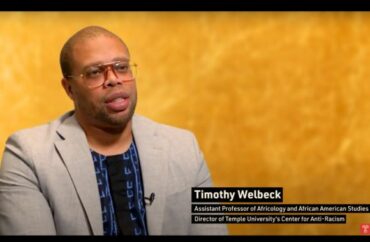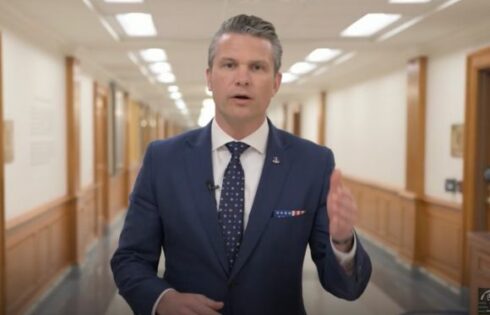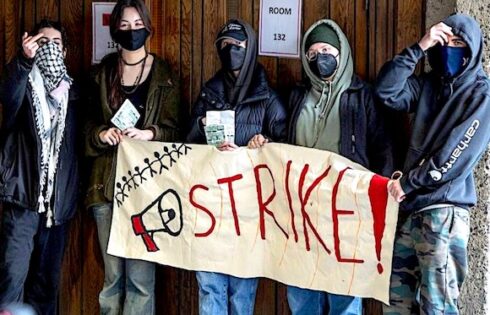
The ‘anti-racism’ center enters third year, has mostly hosted speakers
Pennsylvania taxpayers spent $1.3 million to build Temple University’s “Center for Anti-Racism,” inside an existing school building.
Now entering its third year, the center’s work has largely consisted of conferences and speakers. The $1.3 million state-funded center appears to operate out of a room in Mazur Hall, a pre-existing building on campus.
Timothy Welbeck, an “attorney, professor, scholar and hip-hop artist,” serves as the center’s director, which is a full-time job, according to the university. He previously called it “outrageous” for a judge to have the song “Proud To Be An American” as a ringtone and said critics of the film “The Marvels” are “uncomfortable” seeing women in positions of power.
He deferred to a university communications director when asked for comments by The College Fix.
Though the Center lists research as part of its mission, The Fix could not find any references to published scholarship on its website or social media accounts.
However, additional “programming and scholarship,” is planned, according to university communications director Stephen Orbanek. The university committed more than $1 million in 2020 as part of its efforts to “combat racism.”
Orbanek told The Fix “during the 2023-2024 academic year, CFAR hosted four academic conferences, partnered with city agencies to evaluate systemic racism in city institutions and develop strategies to mitigate its harm in Philadelphia.”
“To that point, during the past year, CFAR Director Timothy Welbeck testified in a Philadelphia City Council hearing in support of newly proposed hate crime legislation, which seeks to mitigate the rise of antisemitism, racism, and xenophobia,” the communications director told The Fix via email.
He said the center has a “diversionary program” for “Justice-Involved Youth” planned. It will “prepare program participants for preparation for matriculating at a post-secondary institution, success in entrepreneurship, and/or successful entry into the workforce.”
He said the program will help “mitigate the impacts of the poverty plaguing Philadelphians” as part of the center’s “fight against racism.”
The center has been criticized by Temple students for a lack of visibility on campus. “We have an anti-racism center?” a black student activist said in January, as reported by the student newspaper.
Additionally, Molefi Asante, a member of CFAR’s advisory board and a professor at the university, told The Temple News earlier this year that “I think the missing thing is the serious intent to have conversation, a dialogue about the eradication of racial hierarchy and all forms of discrimination, whether it is antisemitism [or] Islamophobia.”
Orbanek said multiple offices and divisions within Temple University have taken “prompt action” to address antisemitism, including “its Office of Institutional Diversity, Equity, Advocacy and Leadership (the parent arm of the Center for Anti-Racism).”
He said, “Both the university and our Center for Anti-Racism presently have strong working relationships with Temple’s Hillel chapter and with Chabad at Temple.
He also told The Fix about the university’s commission to address antisemitism.
The College Fix twice emailed Asante but he did not respond to requests for comment in the past several weeks. His voicemail was full, so The Fix could not leave a message.
The Fix also contacted members of the advisory board but none responded to requests for comment in the past several weeks. The Fix asked about future plans for the center, addressing antisemitism, and for an example of the highest impact event.
Higher ed researcher says ‘antiracism’ research is ‘not’ ‘legitimate’
Several higher education researchers criticized the university’s focus on “anti-racism” and “diversity, equity, and inclusion.”
Temple University should not continue to support “antiracism” research because “it’s not a legitimate field of research inquiry,” according to Max Eden, a senior fellow at the American Enterprise Institute.
“‘Anti-racism’ is a purely anti-intellectual politicized simulacrum of a legitimate university research and teaching initiative,” Eden said via email. “It’s only appropriate if you’re really trying to lean in to becoming a laughingstock caricature of your traditional mission.”
He criticized diversity, equity, and inclusion initiatives more broadly, saying “DEI has gained administrative traction without any serious methodological investigation of its value. There’s plenty of data, though, to suggest that DEI programs make campus culture worse.”
“When that happens, as we saw in the NYT profile of [University of Michigan], the DEI apparatchiks claim credit for it because they insist that the fact that students think things are getting worse is actually a sign that they’re successfully raising consciousness about racism.”
Adam Kissel, a visiting fellow at the Heritage Foundation, expressed similar concerns. “Public universities should be academic, not activist,” he told The Fix via email. “They should be institutionally neutral about contested social issues. Committing to ‘antiracism’ activism violates these principles.”
“Temple has declared that ‘systemic racism’ is simply true rather than leaving it open to debate. That’s the opposite of what a public university should do,” Kissel, a former Department of Education official, said. “This area of activism should not be publicly subsidized or repackaged as ‘research.'”
“Programs that focus on ‘equity’ tend to do the opposite: they intentionally have disparate outcomes, often even disparate treatment, on the basis of protected identity groups,” Kissel said. “For example, the equity office at Temple’s medical school offers opportunities uniquely to black medical and premedical students, discriminating on the basis of race.”
While Temple’s Center for Anti-Racism has been active, Boston University’s has been largely inactive and Pennsylvania State University canceled its own. Eden, the AEI education fellow, said this pattern is because “there is no intellectual ‘there’ there. It’s just finding ever more wordy and convoluted ways to call things ‘racist.’”
“BU and Penn State seemed to have learned this lesson,” he said. “Maybe Temple will too, some day.”
MORE: Cornell activists rally behind suspended anti-Israel student
IMAGE: Center for Anti-Racism/YouTube
Like The College Fix on Facebook / Follow us on Twitter






Please join the conversation about our stories on Facebook, Twitter, Instagram, Reddit, MeWe, Rumble, Gab, Minds and Gettr.